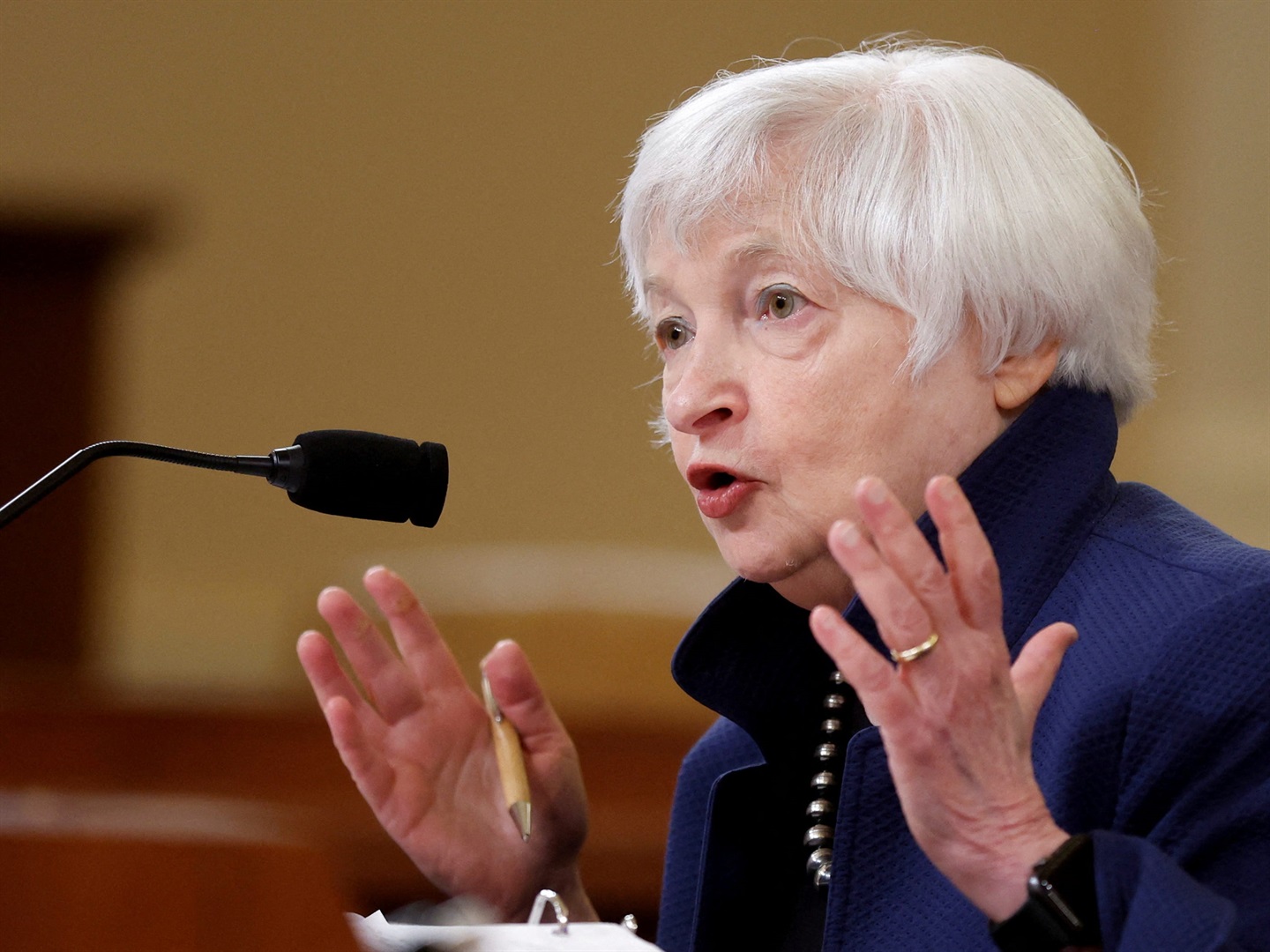
Treasury Secretary Janet Yellen said Sunday that early June is a “hard deadline” for the federal government to raise the debt ceiling and warned that bills will go unpaid if Congress fails to reach a deal before the U.S. runs out of money, in an exclusive interview on “Meet the Press.”
“I indicated in my last letter to Congress that we expect to be unable to pay all of our bills in early June and possibly as soon as June 1. And I will continue to update Congress, but I certainly haven’t changed my assessment,” Yellen said. “So I think that that’s a hard deadline.”
Asked by NBC News’ Chuck Todd if the country can stretch to June 15, when more tax payments are due, before defaulting on its debts, Yellen said the possibility is “quite low.”
“Well, there’s always uncertainty about tax receipts and spending,” she said. “And so it’s hard to be absolutely certain about this, but my assessment is that the odds of reaching June 15th, while being able to pay all of our bills, is quite low.”
Yellen warned that some of the country’s bills will go unpaid if the debt ceiling isn’t raised.
“We take the debt ceiling seriously as a constraint on our ability to pay bills that are coming due,” she said. “And my assumption is that if the debt ceiling isn’t raised, there will be hard choices to make about what bills go unpaid.”
The White House and Republican negotiators remain deadlocked on a deal to raise the debt ceiling after weeks of negotiations. House Republicans want to force major spending cuts that President Joe Biden and congressional Democrats oppose, making it unlikely the House bill will pass in the Democratic-controlled Senate.
The president opened a press conference in Japan by urging Republicans to “move from their extreme positions,” which he criticized as “frankly unacceptable.”
“It’s time for Republicans to accept that there is no bipartisan deal to be made solely solely on their partisan terms,” he said. “They have to move as well.”
House Speaker Kevin McCarthy, R-Calif., on Sunday said he had a “productive” call with Biden, and they agreed to meet in-person Monday afternoon.
“There’s no agreement, we’re still apart, the agreement was to get our teams back together so everyone clearly understands what we’re talking about, what they’re talking about,” McCarthy told reporters. “Let them brief up the president, let him get some sleep. And he wanted to get together personally tomorrow — I agreed to that, we’d do that sometime in the afternoon. Time is of the essence.”
Biden and McCarthy’s staffs are set to reconvene at 6 p.m. Sunday to discuss remaining issues, according to a White House official.
Republicans returned to the debt ceiling negotiating table Friday night after temporarily pausing talks with the White House that they said were “not productive.” Rep. Garret Graves, a Louisiana Republican, who was tapped by McCarthy to lead negotiations with White House staff, told reporters they had “a candid discussion about realistic numbers, a realistic path forward and something that truly changes the trajectory of this country’s spending and debt problem.”
The U.S. hit the statutory debt limit in January and has been using “extraordinary measures” to pay the bills. Amid the ongoing stalemate in Congress, Biden recently said he was considering using the 14th Amendment to bypass the standoff and unilaterally raise the debt ceiling.
Previous administrations have considered invoking the 14th Amendment to raise the borrowing limit, but they never used it — including the Obama administration in which Biden served as vice president.
Asked whether using the 14th Amendment falls into the category of “extraordinary measures,” Yellen said Sunday it’s “used in a different way” and there “hasn’t been much discussion” of using it.
“As President Biden said, I believe this morning, it doesn’t seem like something that could be appropriately used in these circumstances, given the legal uncertainty around it,” she said. “And given the tight time frame we’re on. So my devout hope is that Congress will raise the debt ceiling.”
Biden did not rule out using the 14th Amendment when asked about it during his press conference in Japan: “I’m looking at the 14th Amendment as to whether or not we have the authority.
“I think we have the authority,” he said. “The question is, could it be done and invoked in time that it could not would not be appealed, and as a consequence, pass the date in question, and still default on the debt. That’s a question that I think is unresolved.”
Pressed again, Biden said that “a unilateral action that could succeed in a matter of two weeks or three weeks” has not been agreed upon.
“That’s the issue,” he said. “So it’s up to lawmakers. But, my hope and intention is when we resolve this problem, I find a rationale to take it to the courts and see whether or not the 14th Amendment is in fact something that would be able to stop it.”
This article was originally published on NBCNews.com
PRESS STATEMENT Nigerian Breweries PLC - The pioneer and largest brewing company in Nigeria which is…
Paris Saint-Germain star Achraf Hakimi has spoken out following his defeat by Ademola Lookman for…
Ukrainian boxer Oleksandr Usyk reinforced his position as one of the greatest heavyweight champions in…
The National Emergency Management Agency (NEMA) has said it has put all its zonal, territorial…
Erhiatake Ibori-Suenu, member representing Ethiope Federal Constituency of Delta State in the House of Representatives…
The Economic and Financial Crimes Commission (EFCC) has reportedly secured a final forfeiture order for…